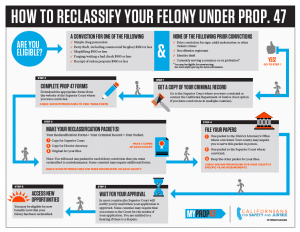A Historic Opportunity for Los Angeles County
Prop. 47 is the largest opportunity in U.S. history for people to change past felony convictions on their records. As many as 1 million Californians may be eligible.
**The record change process (also known as reclassification) is for individuals with a qualifying low-level, nonviolent felony on their criminal record. It does not apply to individuals who are currently serving a sentence in prison or in jail, or currently on probation. There is another process, known as resentencing, for those individuals. Click here for more information on the resentencing process, or contact the Los Angeles County Public Defender’s Office near you.
 The following steps below outline the record change (reclassification) process. You can use our reclassification infographic as a handy guide to follow the steps needed to change your record. The infographic is also available in Spanish (Infográfico Sobre Cómo Cambiar Su Delito Grave Bajo La Proposición 47).
The following steps below outline the record change (reclassification) process. You can use our reclassification infographic as a handy guide to follow the steps needed to change your record. The infographic is also available in Spanish (Infográfico Sobre Cómo Cambiar Su Delito Grave Bajo La Proposición 47).
Determine Your Eligibility:
If you have a felony conviction from Los Angeles County for one or more of the following low-level, nonviolent offenses – no matter how old the conviction – you may be eligible to have your record changed from a felony to a misdemeanor for these offenses:
- Simple drug possession
- Petty theft under $950
- Shoplifting under $950
- Forgery under $950
- Receipt of stolen property under $950
- Writing a bad check under $950
Note: If you are currently serving a sentence for one of the above offenses, you may quality for resentencing. Click here for more information on the resentencing process or contact the Los Angeles County Public Defender’s Office near you.
If you have a previous conviction for crimes such as rape, murder or child molestation, or are in the sex offender registry, you will not be eligible to get the six felonies listed above reclassified. Click here for a full list of crimes that will exclude you from getting your record changed under Proposition 47.
STEP 1: GET A COPY OF YOUR CRIMINAL RECORD
You will need a copy of your “Rap Sheet” (also known as your criminal record or docket) to determine if you are eligible and have no excluding offenses. If your conviction(s) are from Los Angeles county, you can visit the LA County Superior Court website and obtain your record.
If your conviction(s) are from multiple counties, you must visit each county where you received a conviction. You may also contact the State of California Department of Justice’s Criminal Record Review Unit. They will have your criminal record information for all of California.
You can contact the California Department of Justice’s Criminal Record Review Unit by phone at 916-227-3546. Make sure to follow the directions for requesting your record carefully. There is a fee, but you may qualify for a waiver (if you provide written proof that your income is under a certain level). It may take several weeks for your record to arrive in the mail.
STEP 2: COMPLETE YOUR PROPOSITION 47 RECLASSIFICATION FORMS
In Los Angeles County, you will need to complete two documents: 1) an Application for Reclassification (record change); and 2) Proof of Service. Click here to access the forms.
STEP 3: MAKE COPIES OF YOUR COMPLETED RECLASSIFICATION FORMS
You will need to submit a separate reclassification packet for each conviction you would like to have reclassified.
Make three copies of your packet:
1) One original for your records.
2) One copy provided to the District Attorney’s Office.
3) One copy filed in the Superior Court where you were sentenced.
STEP 4: FILE YOUR RECLASSIFICATION PACKET
Typically, one packet will go to the District Attorney’s Office where you were convicted, and one packet will go to the Superior Court where convicted. Keep the packet of original papers for your files. However, the process to file your application may vary depending on the courthouse. Contact the Los Angeles County Public Defender for more information about how to file your papers.
STEP 5: WAIT FOR APPROVAL
After submitting your forms, the Los Angeles District Attorney’s Office will review your application to determine if you are eligible to have your felony reduced to a misdemeanor. If the District Attorney’s Office confirms your eligibility, they will then notify the LA Superior Court. In most cases, you will be notified by mail once the Superior Court has recorded the reclassification. Some judges may require that you return to Court to learn the status of your application.
Typically, a hearing is not needed to process your record change. However, if there is a dispute and your application is denied, you will be entitled to a hearing. In some instances, it may be that your forms were completed incorrectly, which is why working with an attorney or legal clinic is so important. If you qualify, a public defender will represent you at this hearing.
STEP 6: ACCESS NEW OPPORTUNITIES
Once your felony has been removed from your record, you may be eligible for a variety of benefits and opportunities afforded to other Californians, including but not limited to: professional licensing for various trades, student loan eligibility, housing benefits, holding government office and serving on a jury.
